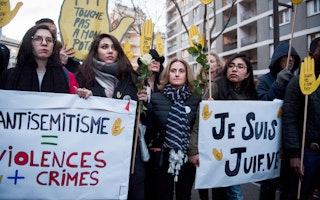
What is ethnic profiling?
Law enforcement engage in ethnic profiling when they base their actions on ethnicity, race, religion, or national origin instead of an individual’s conduct or objective evidence. Ethnic profiling may be carried out by all ranks of law enforcement—from local to counterterrorism units—and it can occur during many policing practices, such as identity checks and border control.
Is ethnic profiling legal?
Police powers to stop and search vary from place to place. But ethnic or racial profiling—the targeting of specific individuals or groups based on appearance—constitutes illegal discrimination under U.S., European, and international law.
Who does ethnic profiling affect?
Minorities and immigrant communities across Europe and the United States have reported discriminatory treatment by the police. The Open Society Justice Initiative has documented widespread profiling in European Union member states, including in Bulgaria, Hungary, Spain, and France, as well as in Russia.
In the United States, racial profiling continues to be a prevalent and egregious form of discrimination [PDF]. Police officers across the United States routinely stop Black and Latino men without cause. Since September 11, 2001, racial profiling has become much more prevalent for Muslim, Arab, and South Asian communities. Equally troubling are local immigration laws that invite rampant profiling of Latinos, Asian-Americans, and others presumed to be “foreign,” based on how they look or sound.
Is it a useful law enforcement tactic?
No. Ethnic profiling is not only unfair but also ineffective and counter-productive. When law enforcement officers treat an entire group of people as suspicious, they target many innocent people and are likely to miss criminals who do not fit the profile. Reliance on ethnic profiling does not improve hit rates, meaning the proportion of identity checks or stops and searches that lead to formal law enforcement action (like arrest).
What is the impact when powers like stop and search are not used with care?
For those who find themselves pulled aside for frequent or abusive stops based solely on their appearance, these stops are often embarrassing, humiliating, and even traumatizing.
People regularly stopped by the police lose confidence in law enforcement agencies. This lack of confidence reverberates through their family, friends, and communities, negatively affecting police-community relations and leading to decreased cooperation with law enforcement agencies.
Do you work directly with police?
Yes, we also work collaboratively with police to develop fairer and more effective policing practices.
In Europe, our pilot projects with police have shown that when police focus resources on genuine threats and build open and positive relationships with ethnic minority communities, they can reduce ethnic profiling and increase their effectiveness. Our policing handbook pulls together examples and offers a conceptual framework for improving efficiency. We continue to invite collaborations with police departments on piloting these best practices.
In the United States, we support the efforts of grassroots activists and reform-minded police leaders as they work to promote safe communities and transform police culture by holding officers accountable for abusive practices such excessive use of force and bias-based stops.
Where is Open Society working to combat ethnic profiling?
We have launched and supported strategic litigation to challenge discriminatory ethnic profiling practices across Europe. This has included court challenges to police stops in the UK, France, and Spain, and has resulted in groundbreaking rulings from the Court of Cassation in France and the UN Human Rights Committee, as well as applications before the European Court of Human Rights (Seydi and others v. France and Zeshan Muhammad v. Spain).
We have also supported civil society, legal organizations, and local community groups to challenge police discrimination through technical advice, facilitation of international exchange, resources, training, and strategy development. And we advocate for standards, tools, and approaches to address ethnic profiling within regional institutions and civil society in some European countries.
The human cost of ethnic profiling and importance of addressing it are often not well understood. We have produced a series of photographic essays and exhibits—featuring first-person accounts from people directly affected by ethnic profiling in England and Wales, France, the Netherlands, and Spain—to illustrate the practice’s often unseen costs and the importance of advancing police practices that are demonstrably fair and effective.
Read more
Combating Hate
Open Society’s Fight Against Antisemitism

The Soros family and Open Society have a long history of combating ethnic, religious, and racial hatred in all its forms. Our track record in tackling the scourge of antisemitism.
Roma Rights
A New Roma-led Vision of Power

The new, independent, Roma Foundation for Europe is backed by a €100 million pledge that builds on Open Society’s over 30 years of support for Roma causes.
Valuing Domestic Work
A Feminist Future of Work: Three African Feminist Leaders Revolutionizing Domestic Work

Three African feminist leaders are seeking to change the way care and domestic workers are seen and treated—pushing for policies and protections.